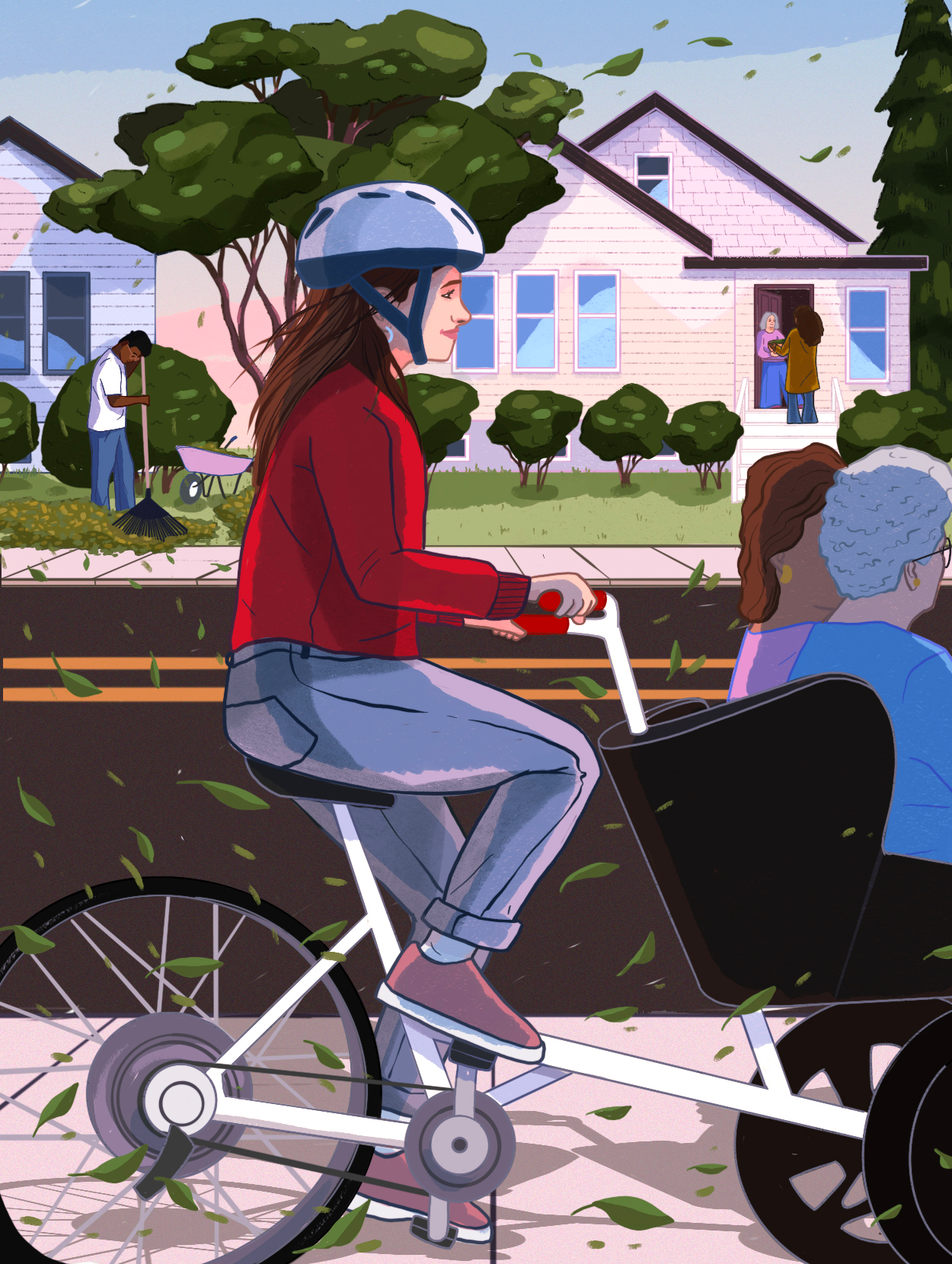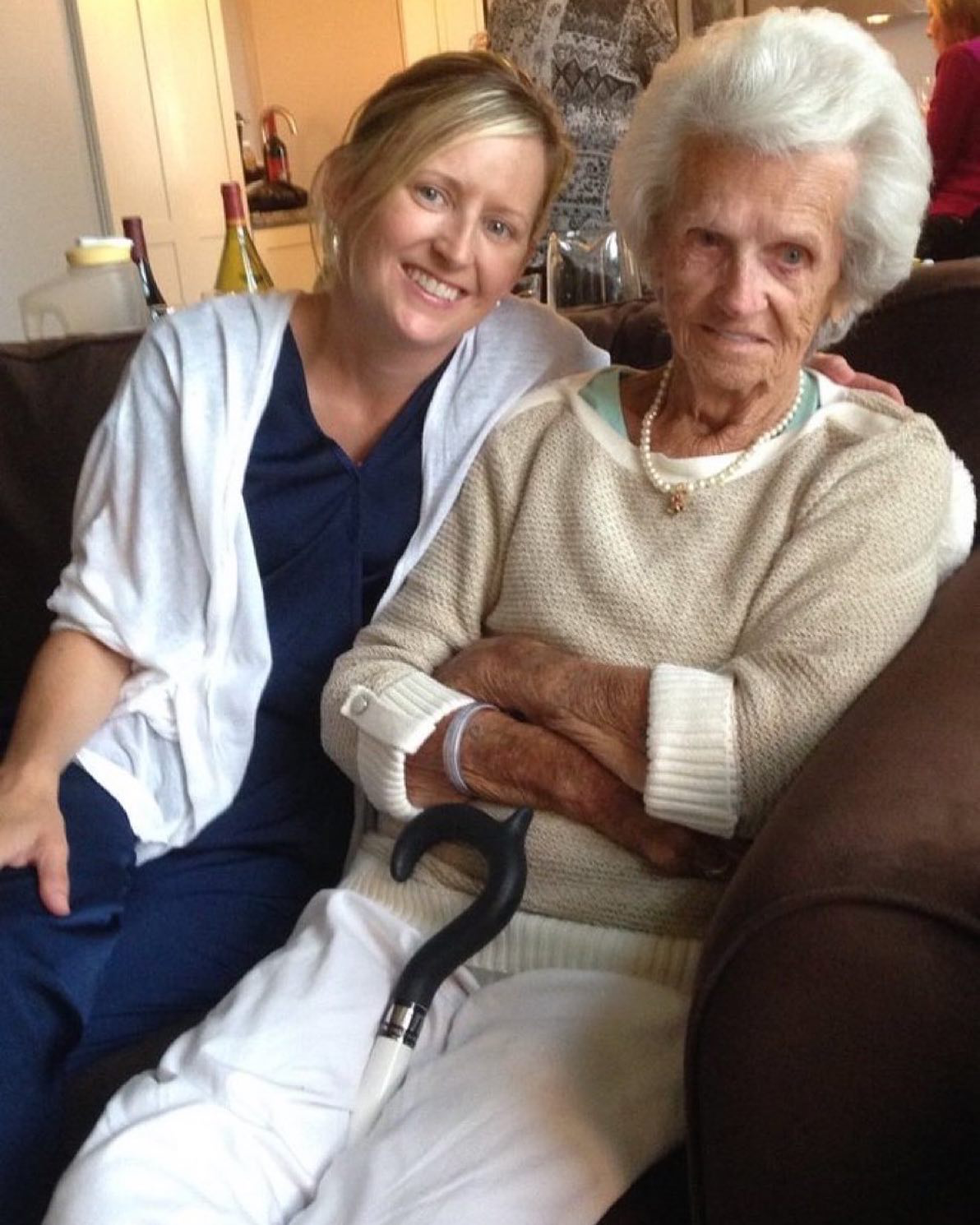
The Good Neighbor
By Julie (Stagis) Bartucca ’10 (BUS, CLAS), ’19 MBA
Illustrations by Kailey Whitman
“We live in a world in which we need to share responsibility. It’s easy to say, ‘It’s not my child, not my community, not my world, not my problem.’ Then there are those who see the need and respond. I consider those people my heroes.”—Fred Rogers
In Mister Rogers’ view, Michelle (Bussiere) Puzzo ’98 (SAH) is a hero.
“Just help people,” says the co-founder, chief executive, and only paid staff member of UR Community Cares. “Just help people that say they need help.”
Talking in her office on the second floor of the Eastside Neighborhood Resource Center in Manchester, Connecticut, Puzzo is the consummate responder, offering solution after solution to problems faced by older adults who seek to age in place in a world where community is diminished, aging is stigmatized, and help is hard to come by — and expensive.
For decades after earning her bachelor’s in physical therapy, Puzzo provided in-home PT to older people after strokes, heart attacks, or surgeries. On most visits, patients would ask for something beyond the scope of her work — a hand with laundry, taking out the trash, or looking up a cleaning service on their smartphones.
“Many people were just living — and struggling to live — alone at home,” she says. Many couldn’t afford an aide or didn’t qualify for assistance programs. She saw it on a personal level, too, with her own grandmother who suffered from macular degeneration and dementia. For years, Puzzo mowed her grandmother’s lawn weekly and helped her with miscellaneous needs, pitching in as the entire family rallied to help Meme live her later years in her home. “She was so reliant on us. It’s hard on a family,” Puzzo says. “We’re just not set up socially to have these support systems.”
After Meme died in February 2019, Puzzo acted on the idea for UR (pronounced “your”) Community Cares, which had been gestating for a while. She registered her business with the state and set up a website; from there, it has been Puzzo waking up at 3 a.m. every day, tapping into resources, connecting with others who want to help, networking, marketing, and raising money to grow one person’s notion into a statewide organization of thousands.
Just before the pandemic hit, Puzzo created Neighbors Helping Neighbors, the signature program of UR Community Cares. Its secure online platform connects volunteers with people over age 70 (or those over 18 with a disability) who need help. Participants on both sides undergo background checks (“Just because you’re 80 doesn’t mean you’re a good person,” Puzzo says), and volunteers can’t do any licensed work, but requests for housework, transportation, yardwork, and companionship are fair game.
“The phone is ringing all day long — insurance company denials, lack of community support, people not able to drive themselves home from a colonoscopy,” Puzzo says. “This really adds value to communities to be able to support people that aren’t able to pay for private caregivers or handymen,” she continues. “The problem exists in every single town. The whole world is aging, and how are we going to handle it?”

“Just help people.
Just help people that say they need help.”
Frank Jones, 77, of Madison, Connecticut, became friends with Puzzo after she did a presentation for seniors in a neighboring town. A disabled veteran who once worked as a health care administrator for a senior living and home health company, Jones has connected with a Neighbors Helping Neighbors volunteer who brings him to appointments and will drive him to an upcoming cataract surgery. Another dusts his home for him, after which they “sit down and have coffee and a good chat. She comes and walks to the beach with me and my service dog, Pinocchia.”
On Thanksgiving, they have a standing date for coffee at McDonald’s so that Jones doesn’t spend the day alone.
When his house, which has been in his family for four generations, caught fire in 2021, Jones says Puzzo was the first person to come down and help him. UR Community Cares helped in ways that other organizations he belonged to — or other aid organizations he expected would help — did not.
“I don’t know how she does it all,” he says of Puzzo, who juggles her work with being the single mom of two young boys. “It seems it’s been a perpetual thing with the elderly in this country not being treated as beneficial, worthwhile members of society. Michelle is trying to turn that around.”
Indeed, part of Puzzo’s crusade is combating stigmas surrounding older adults and providing them opportunities to age with dignity.
“People think that just because they’re older, they lack the ability or capacity to learn, and that’s just not true. They’re still working. They’re still an active part of their community,” Puzzo says. “They might be on committees. They might be volunteering.”
In fact, Puzzo was surprised that so many Neighbors Helping Neighbors volunteers are not the high school students she initially expected but rather retired people looking for meaningful ways to give back. At 84, the oldest volunteer loves to keep busy and offers rides to others. Another older volunteer joined the program in its first year and has given more than 900 hours. “People of any age have the capacity to be better. But their basic needs have to be met,” says Puzzo.
To make real change, “You’ve got to start somewhere,” says Jones. “Even if you help just one person, you have to try.”
Check. In under six years, more than 950 volunteers have helped more than 1,000 members across 150 Connecticut towns, completing upward of 4,500 documented good deeds — and Puzzo knows the real number is even higher.
“People become friends, and they don’t put it in the computer anymore,” she says, half laughing. “They’re like, ‘Oh, Sally comes over.’ It’s great to see that people are becoming friends, but please put it in the computer.”
Those numbers help Puzzo do another thing she’s learned on the fly: write grants to secure money to grow the organization. Showing just how effective her programs are has gotten UR Community Cares included in the human services budgets of seven towns and garnered local and national grants to start more programs — programs that connect people with technology education, recreation, and resources for the blind and vision-impaired.
Neighbors Helping Neighbors
An online portal connects volunteers with older people in need to provide companionship, transportation, housework, or yardwork.
4,500
good deeds
950
volunteers
1,000
community members receiving services
150
Connecticut towns represented

Census figures show that America’s population is older than ever, and the country’s 65-and-over population is expected to grow from about 62 million in 2024 to 84 million by 2054, increasing from 18% of the population to 23%. At the same time, community has eroded to the degree that the former U.S. Surgeon General Vivek Murthy in 2023 declared loneliness and social isolation an epidemic.
As systemic approaches to these problems grow more and more fraught, grassroots efforts like UR Community Cares help fill the gaps.
“Between budget and, more importantly, time, as a town organization we have to answer to our board of directors and act in the best interests of taxpayers, so change and growth take time,” says James Costa ’20 (CLAS), recreation supervisor for the town of Manchester.
“To be able to have a group like UR Community Cares come in and pivot on the fly and look for those needs, supporting whatever is needed because they have that flexibility — it’s a really admirable thing.”
The town partnered with Puzzo, providing space to launch a tech center on the first floor of the Eastside Neighborhood Resource Center — a repurposed historic firehouse that houses division offices and offers public meeting space and community programming.
“Our missions really align, we’re trying to serve underserved, marginalized communities,” Costa says. “They’re targeting a group that we haven’t had success bringing into our space. It was really just an organic fit, and a great resource to keep broadening the populations we’re able to serve.”
The UR Community Tech Center opened its doors in April 2024 and offers drop-in technology assistance hours, workshops, and classes on topics from AI to affordable home internet to digital tools for brain health — and that’s just a sampling of this past April’s schedule.
Volunteers and subsidized employees from a local job center run everything, and as with all else, Puzzo and her team keep coming up with more programming and more uses for the space. To help those, like Puzzo’s Meme, who struggle with vision impairment, the organization launched UR Vision Resources.
Kristen Dockendorff, 64 and legally blind, came to the tech center last year for help setting up recurring payments for her home heating bill and to learn about new assistive technologies. Puzzo told the retired art teacher, who lives in Manchester, about the low-vision center she wanted to start. They worked together to decide what equipment would be most useful for people at the tech center’s new UR Vision Station. This March, Dockendorff led the organization’s first support group for the vision impaired.
“I wanted something to be involved in. I was a teacher for 32 years. I loved doing that. Once a teacher, always a teacher,” says Dockendorff, who was diagnosed at age 6 with retinitis pigmentosa, which causes progressive vision loss. “There was a need for another support group in this area. It gives me a place to feel useful.”
“What we’re offering is this new idea of serving the community, serving them at home, serving them where they are.”
Inspired by her past patients, her grandmother, and the people she continues to meet through her work, Puzzo is brimming with ideas.
Case in point: To combat loneliness and get people out into nature, UR Community Cares raised money recently to buy a rickshaw and establish a local chapter of Cycling Without Age, a global organization that aims to get people outside and into the community for a bike ride.
As she looks out the window over the community gardens outside her space in the neighborhood resource center, she riffs on more ideas — students walk this way to get home from the high school, so maybe they can volunteer after school in the tech center, or perhaps we can adopt a few garden beds for another new program, and build other things for people to do to serve our community based on their interests ...
But that’ll come. Today, two longtime volunteers who happen to be UConn alums — Donna (Oldakowski) Powell ’79 (CLAS) and Steve Couture ’90 (ENG) — are running a tech center event in a half hour, and Puzzo has to work on some website updates. She’ll be up at 3 a.m. to start all over again.
“This is all a passion for humanity,” she says. If anyone is skeptical or asks why she’s the person to do this work, “I just block it out and keep going forward. I just knew there was an opportunity to do something that I really felt was needed. It’s common sense. When you look at programs the state offers, it’s so limited. When you look at what insurance offers, it’s so limited.
“What we’re offering is this new idea of serving the community, serving them at home, serving them where they are.”

Puzzo and Meme

Ms. Puzzois astoundingly fine person in times where cruelty has become the theme of our national government. She and hearty crew give me hope that we can turn things back to being the most caring society on the globe. Thank you UConn for sharing Puzzo’s mission with us. Jay